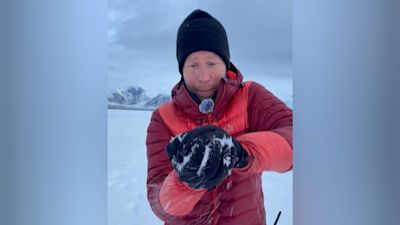Why you can't have a snowball fight in Antarctica

Snow and ice may be the first things you think of when you imagine the Antarctic.
In fact, 90% of the world's ice is located in the Antarctic, and only about 0.4% of the continent's surface isn't covered by it.
However, it's nothing like the snow and ice we may be used to.
Antarctica is a place of extremes. It is the coldest, driest and windiest continent on the planet.
The humidity can be as low as 1%. A stark contrast to the UK, which can see relative humidity above 90%.
Why can't you make a snowball in Antarctica?
Since Antarctica is so dry, it means the snow that is produced there isn't the fluffy substance we're used to. Instead, it's granular and icy.
Liquid water is needed in snow to help grains stick together and hold their shape.
The lack of moisture means it can't be compacted together and just falls apart instead like a powder.
Subscribe free to our weekly newsletter for exclusive and original coverage from ITV News. Direct to your inbox every Friday morning.
Why might you smell worse in Antarctica
The dry conditions in Antarctica also affect your smell.
Since there's so few molecules in the air for your nose to pick up on, that means you can't smell much.
Ice and snow also don't smell, and the lack of any vegetation means there's not much for your nose to pick up on anyway - unless you happen to cross paths with a nearby penguin colony.
So when you leave the desert conditions of outside and re-enter an inside area, you may find yourself assaulted with smells. But it's not that you necessarilly smell worse, but that you have been deprived of them for so long.
ITV News Science Correspondent Martin Stew is the only journalist on board the British research ship the RRS Sir David Attenborough, as it takes part in an expedition deep within the Antarctic Circle.
No other British ship has made the journey this far south, this late in winter, since the explorer Sir Ernest Shackleton's ill-fated Endurance voyage, when his ship became trapped in the pack ice and sank in 1915.
Throughout the trip, ITV News will be exploring how our changing climate is impacting Antarctica and the rest of the planet.
Want a quick and expert briefing on the biggest news stories? Listen to our latest podcasts to find out What You Need To know...